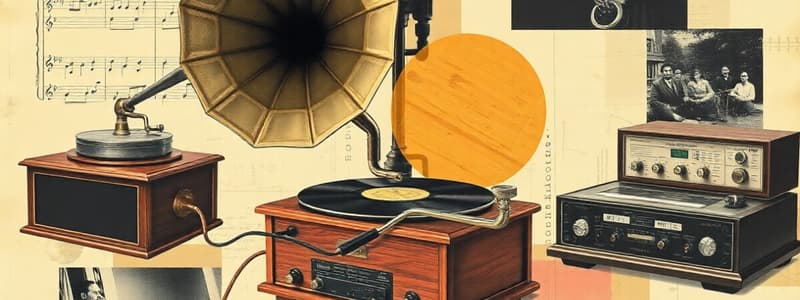Podcast
Questions and Answers
What is considered the orchestral height of Claude Debussy's work?
What is considered the orchestral height of Claude Debussy's work?
- Prelude to the Afternoon of a Faun (correct)
- La Mer
- Clair De Lune
- Bolero
Which of the following pieces is NOT attributed to Maurice Ravel?
Which of the following pieces is NOT attributed to Maurice Ravel?
- Afternoon of a Faun (correct)
- Nocturne
- Bolero
- La Valse
What characteristic is NOT typically associated with Expressionist music?
What characteristic is NOT typically associated with Expressionist music?
- Focus on lyrical melodies (correct)
- Use of abrupt dynamics
- Dramatic tempo changes
- Maximization of pitch ranges
Which composer is recognized as the 'Father of Electronic music'?
Which composer is recognized as the 'Father of Electronic music'?
Which Filipino composer was known as the 'Claude Debussy of the Philippines'?
Which Filipino composer was known as the 'Claude Debussy of the Philippines'?
What was the main reaction of Expressionism to Impressionism?
What was the main reaction of Expressionism to Impressionism?
What does aleatory music emphasize in its composition?
What does aleatory music emphasize in its composition?
How can music be produced using modern technology?
How can music be produced using modern technology?
Who was Arnold Schoenberg's primary musical mentor?
Who was Arnold Schoenberg's primary musical mentor?
At what age did Maurice Ravel pass away?
At what age did Maurice Ravel pass away?
What is one significant feature of Varese's music?
What is one significant feature of Varese's music?
What is a characteristic of electronic music?
What is a characteristic of electronic music?
Which of the following composers is recognized for breaking conventional music writing?
Which of the following composers is recognized for breaking conventional music writing?
Which of the following terms describes the style in which performers can compose music randomly?
Which of the following terms describes the style in which performers can compose music randomly?
In modern music, what role does technology play?
In modern music, what role does technology play?
What technique does electronic music frequently employ?
What technique does electronic music frequently employ?
What significant invention in 1877 changed the way music was consumed in the 19th century?
What significant invention in 1877 changed the way music was consumed in the 19th century?
From which socioeconomic classes were Filipinos likely to use the phonograph during its popularity?
From which socioeconomic classes were Filipinos likely to use the phonograph during its popularity?
What was a key factor that made music education more accessible in the 20th century?
What was a key factor that made music education more accessible in the 20th century?
What musical styles were composed after the First World War?
What musical styles were composed after the First World War?
Impressionist music is characterized by which of the following musical traits?
Impressionist music is characterized by which of the following musical traits?
Which composer is most closely associated with Impressionist music?
Which composer is most closely associated with Impressionist music?
At what age did Debussy begin his formal music education?
At what age did Debussy begin his formal music education?
Which characteristic is NOT typically associated with 20th century music?
Which characteristic is NOT typically associated with 20th century music?
Flashcards are hidden until you start studying
Study Notes
Music and Technological Evolution
- The phonograph, invented in 1877, became widely popular in the 19th century, particularly among Filipino middle and upper classes.
- The transition from phonographs to cassettes, CD players, and recorders marked significant technological advancements in music consumption.
Understanding 20th Century Music
- Music boosts mood and productivity, making it a beloved pastime for teenagers.
- 20th-century music played a crucial role in arts, culture, religion, entertainment, education, economy, and medicine.
- Historical and cultural discoveries shaped musical landscapes, with new genres emerging post-World War I.
- Technologies like radio and mass media enhanced music education and accessibility, democratizing the music experience.
Characteristics of 20th Century Music
- New musical styles focused on evoking emotions, utilizing complex harmonies, incomplete chords, and chromaticism, often generating dreamlike sounds.
- Impressionist music, influenced by visual art like Monet's works, displays contemporary characteristics that reflect its era.
Claude Debussy (1862-1918)
- Born in France, Debussy enrolled at the Paris Conservatoire at age 10.
- Notable compositions include "Prelude to the Afternoon of a Faun," "La Mer," "Nocturne," "Images," and "Clair De Lune."
Joseph Maurice Ravel (1875-1937)
- Ravel was born in France and gave his first public performance at age 7.
- He gained recognition in music competitions, notably securing second place in a piano competition in 1890.
- Famous works include "Bolero," "La Valse," and "Ma mere l'Oie."
Expressionist Music
- Impressionist and Expressionist composers rejected traditional music conventions, embracing freedom and diversity in composition.
- Expressionism conveys emotions like fear and anxiety, contrasting with the beauty of Impressionism.
- Arnold Schoenberg, a key figure in Expressionism, studied in Vienna and created impactful works like "Pierrot lunaire."
Modernism in Music
- The 20th century marked the emergence of modern music, influenced by scientific advancements.
- Environmental sound recordings were incorporated into compositions, giving rise to electronic music, chance music, and minimalist arrangements.
- Electronic instruments provided tools for innovative music creation, blurring lines between electronic and traditional music forms.
Edgard Varese: The Father of Electronic Music
- Varese (1883-1965) emphasized rhythm and timbre, coining the term "organized sound."
- His compositions reflected modern musical techniques and embraced polyphony.
Chance Music
- Also known as Aleatory music, Chance music allows unpredictability in sound arrangement, much like rolling dice.
- Performers may have the flexibility to structure and play sections as they wish, leading to unique and spontaneous musical experiences.
Studying That Suits You
Use AI to generate personalized quizzes and flashcards to suit your learning preferences.




